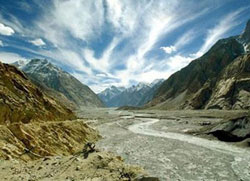
Islamabad, May 27: Nearly 50 days after an avalanche slammed into a high-altitude Pakistan Army camp in the Siachen sector near Indian border, search teams have found the body of one of the 139 people who were buried under dozens of feet of snow in the world's highest battleground.
The body was identified as that of Mohammad Hussain, one of the 128 soldiers from the Northern Light Infantry who were buried by the avalanche on April 7. Eleven civilian employees of the army were also buried under the snow.
The body was found early this morning after search teams uncovered a check post for the residential barracks of the soldiers, TV news channels reported.
The body was shifted to a military hospital at Goma.
More discoveries were expected over the next few days, the TV news channels said.
Over the past few weeks, the military has said that search teams working at the site of the avalanche at Gyari had found equipment and personal effects of the soldiers.
The search teams were also working to tackle the effects of ponds that had formed at the site.
The military has used ground penetrating radars and dug tunnels as part of its efforts to locate the soldiers buried by the avalanche.





Comments
Add new comment